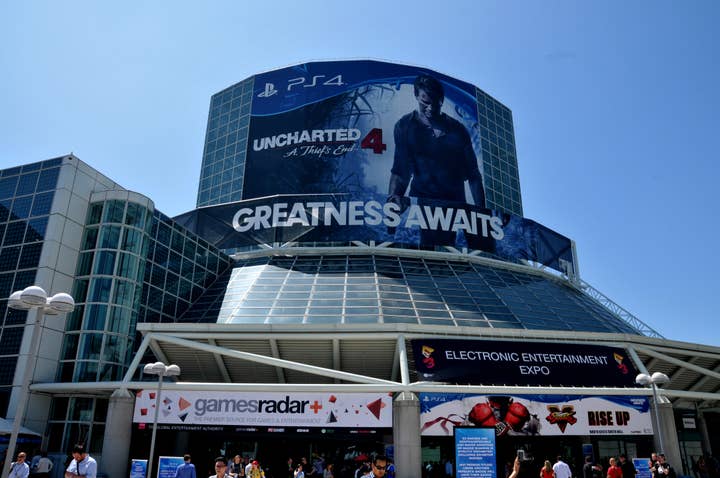E3 struggles to find its purpose
The week of E3 is huge, but the show itself is long in the tooth, shrinking, and shedding exhibitors; the ESA needs to find the courage for serious reform
What is the point of E3? I ask not in a snarky tone, but one of genuine curiosity, tinged with concern. I'm simply not sure what exactly the show's organisers, the ESA, think E3 is for any more. Over the years, what was once by far the largest date in the industry's annual calendar has stuck out in various new directions as it sought to remain relevant, but it's always ended up falling back to the path of least resistance - the familiar halls of the Los Angeles Convention Centre, the habitual routine of allowing only those who can prove some industry affiliation to attend. For all that the show's organisers regularly tout minor tweaks to the formula as earth-shattering innovation, E3 today is pretty much exactly the same beast as it was when I first attended 15 years ago - and by that point, the show's format was already well-established.
There's one major difference, though; E3 today is smaller. It now struggles to fill the convention centre's halls, and a while back ditched the Kentia Hall - which for years promised the discovery of unknown gems to anyone willing to sift through its morass of terrible ideas. Kentia refugees now fill gaps in the cavernous South Hall's floor plan, elevated to sit alongside a roster of the industry's greats that gets more meagre with each passing year. This year, attendees at E3 will find it hard not to notice a number of key absences. The loss of Konami's once huge booth was inevitable given the company's U-turn away from console publishing, but the decisions of EA and Activision to pull out of the show this year will be felt far more keenly.
"E3 has an identity crisis. It wants to be a global show in the age of the local, in an age where "global" is accomplished by pointing a camera at a stage"
Hence the question; what's the point? Who, or what, is E3 actually meant to be for? It's not for consumers, of course - they're not allowed in, in theory, though the ESA has come up with various pointlessly convoluted ways of letting a handful of them in anyway. It's for business, yet big players in the industry seem deeply dissatisfied with it. It's not just EA and Activision, either; even the companies who are actually exhibiting on the show floor seem to have taken to viewing it as an addendum to the actually important part of the week, namely their live-broadcast press conferences. Once the realm only of platform holders, now every major publisher has their own - and if EA and Activision's decision to go their own way entirely, leaving the E3 show floor, has no major negative consequences for them this year, you can be damned sure others will question the show's cost-value next year.
The problem is that the world has changed and E3 has not. Once, it was the only truly global event on the calendar; back then, London had ECTS and Tokyo had TGS, but there was no question of them truly challenging E3's dominance. The world was a very different place back then, though. It was a time before streaming high resolution video, a time before the Internet both made the world a much smaller place, and made the hyper-local all the more relevant. Today, E3 sits in a landscape of events most of which, bluntly, justify their existence far better than the ESA's effort does. Huge local events in major markets around the world serve their audiences better than a remote event in LA; GamesCom in Germany and TGS in Tokyo remain the biggest of those, but there are also major events in other European, Asian and Latin American countries that balance serving the business community in their regions with putting on a huge show for local consumers.
In the United States, meanwhile, E3 finds itself assailed on two sides. The PAX events have become the region's go-to consumer shows, and a flotilla of smaller shows cater well to specific business and social niches. GDC, meanwhile, has become the de facto place to do business and for the industry to engage in conversation and debate with itself. The margin in between those two for a "showcase show that's not actually for consumers but sort-of lets some in and is a place for the industry to do business but also please spend a fortune on a gigantic impressive stand" is an increasingly narrow piece of ground to stand on, and E3 is quite distinctly losing its balance.
A big part of the reason for that is simply that E3 has an identity crisis. It wants to be a global show in the age of the local, in an age where "global" is accomplished by pointing a camera at a stage, not by flying people from around the world to sit in the audience. It wants to be a spectacle, and a place to do business, and ends up being dissatisfying at both; it wants to excite and intrigue consumers, but it doesn't want to let them in. The half-measures attempted over the years to square these circles have done nothing to convince anyone that E3 knows how to stay relevant; slackening ties to allow more consumers into the show simply annoys people who are there for work, and annoys the huge audience of consumers who remain excluded. The proposed consumer showcase satellite event, too, will simply annoy companies who have to divide their attention, and annoy consumers who still feel like they're not being let in to the "real thing". Meanwhile the show itself feels more and more like the hole in the middle of a doughnut - all these huge conferences, showcases and events are arranged around E3's dates, but people spend less and less time at the show proper, and with EA and Activision go two of the major reasons to do so. (It's also hard not to note, though I can't quantify it in figures, that more industry people each year seem to stay home and watch the conferences online rather than travelling to LA.)
"[The] week [around E3] deserves to be served by a better core event, rather than inexorably moving towards being a ton of media events orbiting a show nobody can really be bothered with"
The answer to E3's problems has to be an update to its objectives; it has to be for the ESA to sit down with its membership (including those who have already effectively abandoned the show) and figure out what the point of the show is, and what it's meant to accomplish. The E3 brand has enormous cachet and appeal among consumers; it's hard to believe that there's no demand for a massive showcase event at the LA Convention Centre that actually threw its doors open to consumers, it's simply a question of whether ESA members think that's something they'd like to participate in. From a business perspective, I think they'd be mad not to; the week of E3, loaded with conferences and announcements, drives the industry's most devoted fans wild, and getting a few hundred thousand of them to pass through a show floor on that week would be one of the most powerful drivers of early sentiment and word of mouth imaginable.
As for business; it's not like there isn't a tried, tested and long-standing model for combining business and consumer shows that doesn't involve a half-baked compromise. Tons of shows around the world, in games and in other fields, open for a couple of trade days before throwing the doors open to consumers over the weekend. Other approaches may also be valid, but the point is that there's a simple and much more satisfying answer than the daft, weak-kneed reforms the ESA has attempted ("let's let exhibitors give show passes to a certain number of super-fan consumers" - really? Really?).
E3 week remains a big deal; E3 itself may be faltering and a bit unloved, but the week around it is pretty much the only truly global showcase the industry has created for itself. That week deserves to be served by a better core event, rather than inexorably moving towards being a ton of media events orbiting a show nobody can really be bothered with. The organisers at the ESA need to be brave, bold and aggressive with what they do with E3 in future - because just falling back on the comfortable old format is starting to show diminishing returns at an alarming rate.









